Service Alert
Le 1 juillet, Fête du Canada
À l’occasion de la Fête du Canada, le CAÉB sera fermé le mardi 1 juillet. Les heures d’opération régulières reprendront le mercredi 2 juillet. Nous vous souhaitons un bon congé!
À l’occasion de la Fête du Canada, le CAÉB sera fermé le mardi 1 juillet. Les heures d’opération régulières reprendront le mercredi 2 juillet. Nous vous souhaitons un bon congé!
Articles 1 à 20 sur 48582
Women Thrive Magazine is a global publication for women in business and entrepreneurship, featuring inspirational and practical articles to help…
women dream bigger and achieve their goals. We feature women from all walks of life sharing their stories, tips, strategies and ideas to help others thrive. If you are a woman in business, entrepreneurship or are committed to personal growth and development, this publication is for you.Renowned for its superb photo-features, and its ability to secure exclusive access to the social elite, HELLO! has been capturing…
key moments in celebrities lives ever since it was launched more than 20 years. Each issue is rich mix of articles and interviews from around the world balanced by a series of regular practical features designed to appeal to every type of reader.A weekly magazine offering a signature mix of reporting and commentary on politics, international affairs, popular culture and the arts,…
science and technology, and business, along with fiction, poetry, humor, and cartoons.For Canadians 45 and up. Each issue brings you tips on living healthy, staying fit, and making your money last.…
Enjoy travel advice, arts and food reviews, stylish shopping, health breakthroughs and secrets to successful intimacy. Plus, meet fascinating celebrities, spiritual leaders, authors and more!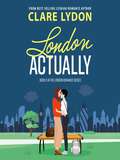
Par Clare Lydon. 2019
She Had One Rule. She Broke It... Cleo Nightingale, star event-planner and recent member of the 'My Marriage Went Kaput'…
club, is dipping her toe back in the dating pool. She's armed with one steadfast rule: absolutely no dating younger women. Simple, right? Enter Becca Cramer, just out of university, footloose and fancy-free. She's not hunting for love, but as fate would have it, she stumbles right into Cleo's carefully planned life. They share a drunken kiss. They meet again. Then all hell breaks loose... Prepare yourself for a riot of a ride featuring two weddings, a festival with more drama than EastEnders, a brother nursing a bruised ego, and a bestie who's about to drop. Book five in the much-loved London Romance series delivers yet another hilarious and heartwarming tale: a story of unexpected love, and the joy of not playing by the rules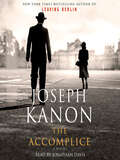
Par Joseph Kanon. 2019
One of AudioFile's Best Audiobooks of 2019! Named "The Book of the Year" by Lee Child in The Guardian From…
"master of the genre" ( The Washington Post ) and author of Leaving Berlin , a heart-pounding and intelligent espionage novel about a Nazi war criminal who was supposed to be dead, the rogue CIA agent on his trail, and the beautiful woman connected to them both. Seventeen years after the fall of the Third Reich, Max Weill has never forgotten the atrocities he saw as a prisoner at Auschwitz—nor the face of Dr. Otto Schramm. He was the camp doctor who worked with Mengele on appalling experiments and who sent Max's family to the gas chambers. As the war came to a close, Schramm was one of the many high-ranking former-Nazi officers who managed to escape Germany for new lives in South America, where leaders like Argentina's Juan Perón gave them safe harbor and new identities. With his life nearing its end, Max asks his nephew Aaron Wiley—an American CIA desk analyst—to complete the task Max never could: to track down Otto in Argentina, capture him, and bring him back to Germany to stand trial. Unable to deny his uncle, Aaron travels to Buenos Aires and discovers a city where Nazis thrive in plain sight, mingling with Argentine high society. He ingratiates himself with Otto's alluring but damaged daughter, whom he's convinced is hiding her father. Enlisting the help of a German newspaper reporter, an Israeli agent, and the obliging CIA station chief in Buenos Aires, he hunts for Otto—a complicated monster, unexpectedly human but still capable of murder if cornered. Unable to distinguish allies from enemies, Aaron will ultimately have to discover just how far he is prepared to go to render justice. "With his remarkable emotional precision and mastery of tone" ( Kirkus Reviews , starred review), Joseph Kanon crafts another "gripping and authentic" ( The New York Times Book Review ) thriller that you won't be able to put downSolve Animal Mysteries from A to Z! Inspired by Ron Roy's A to Z Mysteries series, this exciting animal adventure…
mystery is perfect for budding young chapter book readers. This time, 8-year-old Abbi and her friends solve a mystery with the help of dolphins! It's the weekend — a perfect day for a sail off the coast of Maine. But there's something fishy going on with the local dolphins and Abbi, Lydia, and Daniel are determined to find out why. Are the dolphins twisting, leaping, and whistling because they're playing? Or is it a warning of nearby danger? And if it's danger, how can the kids get grownups to believe them? Abbi and her friends are diving head first into this mystery! Don't miss the first books in the A to Z Animal Mysteries series: #1: The Absent Alpacas #2: Bats in the Castle #3: Cougar Clues Ready for more? Check out the original A to Z Mysteries series by Ron Roy!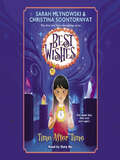
Par Sarah Mlynowski. 2023
The New York Times bestselling series! Pass the magic on! This enchanting multi-author series is like American Girl with magic.…
In this book, written by bestselling author Sarah Mlynowski and three-time Newbery Honor recipient Christina Soontornvat, the magic bracelet comes to a girl in Texas, who ends up in a Groundhog Day -style time loop. Lucy Usathorn of Fort Worth, Texas is super excited for her class trip to the Natural History Museum, where her dad works. Sure, Ms. Brock, the strict school librarian who happens to be dating Lucy's dad (awkward) is chaperoning, but it'll still be the best day ever, right? Wrong! Lucy has to watch in shock and humiliation as her dad proposes to Ms. Brock. Lucy is distraught. If only she could do this whole day over from scratch . . . Enter the magic bracelet. It arrives in the mail, with a long letter from Addie, a girl in Columbus, Ohio, who had the bracelet last time. The bracelet grants wishes, and Lucy knows just what to wish for: a do-over day, where she'll fix everything and most importantly, prevent her dad from proposing to Ms. Brock. The wish comes true— but not quite as Lucy expected. Her day keeps repeating over and over , and things keep getting worse in unique (and hilarious) ways. With the help of her new long-distance friends, Addie and Becca, will Lucy be able to figure her way out of this time loop . . .before it's too late?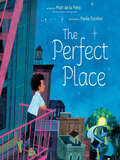
Par Matt de la Peña. 2024
From the Newbery Medal-winning author of Last Stop on Market Street comes this moving picture book—adapted for audio—about the perils…
of perfectionism. Lucas goes to the perfect school in the perfect neighborhood. But life at home is not so perfect. His dad’s old work truck stalls in front of the school. The electricity is out when he gets home, and he doesn’t even have time to show his mom his report (on which he received a perfect score) before she rushes off to her night job. That night, Lucas dreams of a strange light, which he follows down the fire escape, into the alleyway, clear out of his neighborhood, all the way to the place where the perfect people live. Everything there is more beautiful than he could have imagined. But is it possible things aren’t as perfect as they seem? This lyrical picture book—adapted for audio—highlights the beauty to be found in even the humblest of homes and in a family that may not be materially rich but is rich in love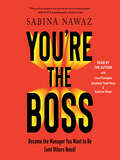
Par Sabina Nawaz. 2025
Turn the hidden pressures of management into astonishing results and become the boss everyone wants to work for. This must-read…
guide from elite executive coach Sabina Nawaz reveals the leadership secrets of highly successful managers. Whether you're in the C-Suite or newly promoted, you're most likely succeeding at your job. But are you reaching your full potential as a manager? Most top performers suspect they aren't, and Sabina Nawaz, former Microsoft executive and elite Fortune 500 coach, says they're usually right. Unfortunately, it's often hard to recognize the problem or know how to address it. In You're the Boss , Nawaz taps her experience and proprietary data drawn from analyzing and advising executives at organizations like Amazon, Microsoft, Google, Motorola, Nordstrom, and the United Nations, to offer managers everything they need to know to succeed at the job. Her work reveals that as our job expands, the added pressure to perform corrupts our actions, and our increased power will blind us to the impact of those actions. Even the most well-intentioned manager can quickly become the boss nobody wants to work for. You're the Boss is your executive coach in book form. It offers a fresh, evidence-based framework for managing pressure and power with grace and intelligence. Nawaz's potent, proven strategies guide you to anticipate the unavoidable hazards of leadership without changing who you are, based on over two decades of coaching and in-depth research into the psychology of behavior and relationships. Discover a powerful way to manage yourself and others, navigate working relationships, and communicate effectively. Become the boss you want to be—and others need—while experiencing less stress and greater impact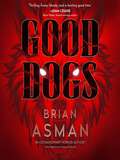
Par Brian Asman. 2024
The debut novel from viral horror sensation Brian Asman, Good Dogs is a heartfelt and harrowing story of survival, belonging,…
found family, and the lengths we'll go to protect it. No one ever said being a werewolf was easy. Take Delia, for instance. She's spent much of her life fighting against her own nature, plagued by nightmares of childhood trauma, and trying to find her place in the world. Many werewolves are just like her: ostracized by their families, forced to live alone and in secret as they await those nights when the Change overtakes them. Becoming the den mother to an odd bunch of lycanthropes in Southern California isn't exactly the answer Delia was looking for. But under the strict rules of the house, they are able to manage the Change safely and hunt without endangering their San Diego suburb. And they aren't lone wolves anymore, they're a pack—a family. But when one member's carelessness leads to the discovery of a severed leg in their backyard, Delia and the rest of her family are forced to confront the cold, hard fact they've known all along—they don't belong here. Their only option is to cover up the kill and head into the wilderness, far from people. There, hopefully, they can live out their lives without posing a threat to anyone else. At home, they might've been apex predators. But in the wilds around Talbot—a town abandoned for a century—Delia and her pack aren't the only ones with a savage bite
Par Piper Rayne. 2020
***NOW A USA TODAY BESTSELLER*** Imagine lying in a hospital bed and the doctor who pulls the curtain back to…
treat you is the one who got away. Even if you never really had her in the first place. She's not only your high school crush, she's the ex-girlfriend of your ex-best friend. The one girl you've always wanted. Here's a step-by-step list to finally win her over... Key to win #1: Try not to take offense that she snuck back into town without telling you—six months ago. Key to win #2: Rekindle the friendship to ease the awkwardness. But... DO NOT enter the friend zone. Key to win #3: Ignore the fact that she went speed dating the night before. Take it as good a sign—maybe she's looking for a relationship. Key to win #4: Attempt to keep the two of you out of the town gossip blog and away from your large family. Make sure you don't let this last one throw you off your mission. Key to win #5: Don't get deterred when you find out the past is about to repeat itself. Because the man she met at the speed dating night is your best buddy from work. Just remember, you sat back and let her slip away once, you won't do it a second time. Failure is not an option. Author Note: This book does NOT contain cheating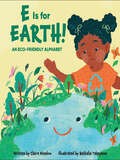
Par Claire Winslow. 2024
From A to Z, explore our amazing planet and how you can help care for it in this introduction to…
going green! With inspiring language and vibrant illustrations, this alphabet book introduces readers to the exciting world of environmental activism and the big and small steps that children can take to help protect the earth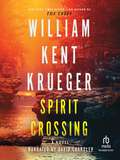
Par William Kent Krueger. 2024
William Kent Krueger—"a master storyteller at the top of his game" (Kristin Hannah)—returns with a breathtaking new novel in his…
New York Timesbestselling Cork O'Connor series. After the teenage daughter of a prominent Minnesota politician goes missing, a huge manhunt is launched to find her. But when Cork O'Connor's grandson Waaboo stumbles across the shallow grave of a young Ojibwe woman while hunting blueberries, nobody seems to care. Nobody, that is, except Cork and the newly formed Iron Lake Ojibwe Tribal Police Department. As Cork and the tribal officers dig into the circumstances of her murder, they discover a link to the missing girl that suggests these are not isolated incidents, but evidence of something much more sinister. Already, tensions in the small town of Aurora, Minnesota, are high as residents gather to protest an oil pipeline that is being constructed through the pristine forests sacred to the Ojibwe at a place known as Spirit Crossing. In the meantime, little Waaboo, who has a unique connection with the dead woman, has become a target for the killers, and Cork's daughter, Annie, has returned home with a secret that threatens to tear the family apart. The closer Cork gets to finding the answers he seeks, the more he fears for the people he loves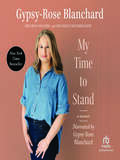
Par Gypsy-Rose Blanchard. 2024
New York Times Bestseller A victim of her mother's Munchausen by proxy and child abuse survivor, Gypsy-Rose Blanchard's unique and…
controversial case made headlines across the world. Now, she's finally free to start living her life on her terms—and to tell her own story as only she can. Forced to use a wheelchair in public and endure a lifetime of faux illness, fraud, and exploitation, Gypsy was subjected not only to her mother's medical, physical, and emotional abuse, but deprived of childhood milestones. Prevented from attending school or socializing, Gypsy's formative years were defined by pain and isolation. After serving eight years in prison for the role she played in her mother Dee Dee's murder, Gypsy is embracing her fresh start—and reminding all of us that it's never too late. In this revelatory, harrowing, and ultimately hopeful memoir, Gypsy shares the painful realities she grew up with and the details of her life that only she knows, including: • The abusive cycle that began with Dee Dee's abuse by her father • Gypsy's fear that continued unnecessary surgery would leave her truly disabled • How she coped with guilt and accepted responsibility for her mother's death • Memories of her final days in prison • What she learned upon reviewing her own medical records for the first time • How it felt to finally see her family again as her authentic self Featuring new facts about Gypsy's life that she previously kept private, My Time to Stand offers an unprecedented look at the real Gypsy-Rose Blanchard, proudly embarking on her ongoing journey to recovery and self-discovery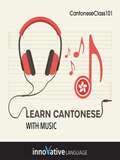
Par LLC Innovative Language Learning. 2022
Can learning Cantonese be as simple as listening to music? And as easy as remembering song lyrics? Just think. You…
remember song lyrics because lyrics are catchy, repeated throughout the song, and go with the music, right? Now, if you stuck in Cantonese, you'd easily learn Cantonese words and phrases the same way! So, yes, learning Cantonese is as easy as listening to music... with the Learn Cantonese With Music audiobook. Just press play, and you'll hear Cantonese words and phrases repeated to the beat of upbeat and cheerful music. And... follow along! You'll learn 180+ most common Cantonese words and phrases while relaxing at home, or while driving to work. Learn Cantonese With Music is the easiest way to start learning Cantonese without getting overwhelmed by complicated explanations. Perfect for new learners with little to no language learning experience. What will you learn? 180+ Words & Phrases Including... Basic Greetings Numbers Common Questions and Answers Parts of the Body & Talking About Your Wellbeing Common Hobbies And much more Learn Cantonese With Music includes... 15 Songs/Lessons Inside (Each is about 7 minutes long) Fast-Paced Review Section at the End of Each Lesson 1 Hour 50 Minutes in Total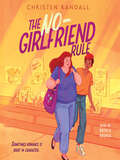
Par Christen Randall. 2024
An instant USA TODAY bestseller Three starred reviews! Julie Murphy meets Heartstopper with a D&D twist in this "magical, heartwarming"…
(Rachael Lippincott, #1 New York Times bestselling author of She Gets the Girl ) queer romance about a teen girl whose foray into fantasy tabletop roleplaying brings her new confidence, true friends, and a shot at real, swoon-worthy love. Hollis Beckwith isn't trying to get a girl—she's just trying to get by. For a fat, broke girl with anxiety, the start of senior year brings enough to worry about. And besides, she already has a boyfriend: Chris. Their relationship isn't particularly exciting, but it's comfortable and familiar, and Hollis wants it to survive beyond senior year. To prove she's a girlfriend worth keeping, Hollis decides to learn Chris's favorite tabletop roleplaying game, Secrets & Sorcery—but his unfortunate "No Girlfriends at the Table" rule means she'll need to find her own group if she wants in. Enter: Gloria Castañeda and her all-girls game of S&S! Crowded at the table in Gloria's cozy Ohio apartment, the six girls battle twisted magic in-game and become fast friends outside it. With her character as armor, Hollis starts to believe that maybe she can be more than just fat, anxious, and a little lost. But then an in-game crush develops between Hollis's character and the bard played by charismatic Aini Amin-Shaw, whose wide, cocky grin makes Hollis's stomach flutter. As their gentle flirting sparks into something deeper, Hollis is no longer sure what she wants...or if she's content to just play pretend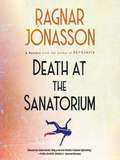
Par Ragnar Jónasson. 2024
This program is read by actor Sam Woolf, known for his roles on Call the Midwife, Humans, The Crown, and…
The Witcher . He currently stars in the World War II drama We Were The Lucky Ones . Fresh off his career-changing standalone co-written with Icelandic PM, Reykjavík , #1 Icelandic bestseller Jonasson presents a riveting new thriller spinoff from The Darkness , soon to be a TV series. 1983 At a former sanatorium in the north of Iceland, now a hospital ward, an old nurse, Yrsa, is found murdered. Detective Hulda Hermannsdottir and her boss, Sverrir, are sent to investigate her death. There, they discover five suspects: the chief physician, two junior nurses, a young doctor, and the caretaker, who is arrested following false testimony from one of the nurses, but subsequently released. Less than a week after the murder, the chief physician, is also found dead, having apparently fallen from a balcony. Sverrir, rules his death as suicide and assumes that he was guilty of the murder as well. The case is closed. 2012 Almost thirty years later, Helgi Reykdal, a young police officer, has been studying criminology in the UK, but decides to return to Iceland when he is offered a job at the Reykjavik police department—the job which detective Hulda Hermannsdottir is about to retire from. He is also a collector of golden age detective stories, and is writing his thesis on the 1983 murders in the north. As Helgi delves deeper into the past, and starts his new job, he decides to try to meet with the original suspects. But soon he finds silence and suspicion at every turn, as he tries to finally solve the mystery from years before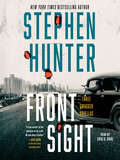
Par Stephen Hunter. 2024
A collection of three interconnected novellas that follow each generation of the iconic Swagger family—grandfather Charles, father Earl, and fan…
favorite hero Bob Lee—from New York Times bestselling author, Pulitzer Prize winner, and "true master at the pinnacle of his craft" (Jack Carr, #1 New York Times bestselling author) Stephen Hunter. In City of Meat , Charles Swagger is on the hunt for notorious bank robber Baby Face Nelson when he traces a tip to the Chicago stock yards. While there, he's brutally assaulted by a madman involved in a nearby narcotics ring. The ring plans to spread its new drug to the residents of the disenfranchised 7th District of Chicago and to make matters worse, this is no ordinary drug—it makes some users happy, drives others insane, and kills many of the rest. Will Charles be able to stop the ring before it's too late? Or is he in over his head among the dark streets of Chicago? Earl Swagger investigates a violent bank robbery that left two dead and a fortune missing in small-town Maryland in Johnny Tuesday . At every turn, however, he's met with silence and hostility from the townsfolk, which makes sense when he uncovers municipal corruption, gang politics, jaded aristocrats, scheming gamblers, a hitman, a femme fatale, and a whole bunch of men with guns. Luckily, Earl has brought his own guns in this unputdownable noir mystery. Finally, in Five Dolls for the Gut Hook , a thirty-two-year-old Bob Lee Swagger is back from Vietnam nearly broken over good men lost for nothing. He's turned down that whiskey road to hell. But one afternoon he's awakened from his nightmares by two men with a problem. As nearby Hot Springs tries to retool its image from gambling paradise to family resort, a butcher has begun to prey on the city's young women, a figure straight out of a horror movie. Hot Springs Homicide is baffled and recruit Bob's help. "I'm a sniper," says Bob, "not a detective." "But," comes the reply, "you are the son and grandson of two of the greatest detectives this state has ever produced." On that premise alone, Bob takes up the hunt for a killer who not only kills but desecrates. At the same time, we understand that Bob Lee Swagger is also hunting for his own salvation
Par LLC Innovative Language Learning. 2017
The easiest way to speak Arabic in minutes! Grasp the language, culture, and customs in just minutes more with the…
Ultimate Getting Started with Arabic, the easiest way to learn Arabic! The Ultimate Getting Started with Arabic will have you speaking with proper pronunciation from the very first lesson and arm you with cultural insight and other information to utterly surprise and amaze your Egyptian friends. What you get with Ultimate Getting Started with Arabic: Series included: Learn Arabic: Introduction to Arabic; Top 25 Arabic Questions You Need to Know; and a Bonus Series: 3-Minute Egyptian Arabic 320+ pages of Arabic learning material 75 Audio Lesson Tracks (over 8.5 hours of Arabic lessons) You see, unlike other audiobooks, we actually teach both Arabic and Egyptian culture. With each lesson, you will master a target phrase and key vocabulary. This is a complete lesson taught by a professional, bilingual teacher! This is NOT a vocabulary audiobook with just words and their translations. These 75 short and effective audio lessons will allow you to: Speak Arabic within minutes of your first lesson Understand the culture, customs, and people of Egypt Order the food you want in restaurants Travel in taxis, trains, buses, and cars with confidence Master manners, etiquette, and customs Remember must-know sentences for daily conversations Learn surprisingly natural phrases and tips that will leave your hosts wondering where you learned them. Interactive. Effective. And FUN! Buy this now and start speaking Arabic instantly!